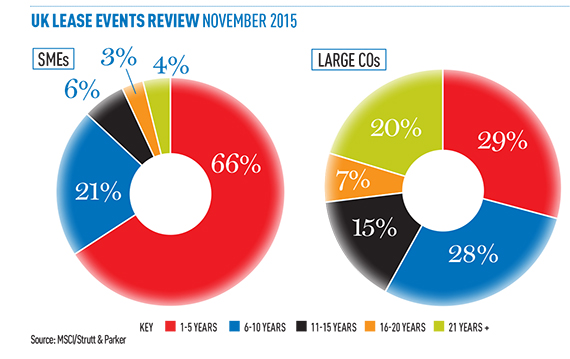 Although today’s high-tech occupiers prefer agility and flexibility, London’s dearth of space and high demand mean landlords are still thinking long-term. But shorter leases are creeping into the market. Elaine Cavanagh reports
Although today’s high-tech occupiers prefer agility and flexibility, London’s dearth of space and high demand mean landlords are still thinking long-term. But shorter leases are creeping into the market. Elaine Cavanagh reports
Youthful technology and media start-ups continue to flourish in London, even daring to infiltrate the lofty bastions of big banks and law firms.
Nimble and reactive, they operate with flexibility in mind. However, low vacancy levels in central London – currently less than 4% – coupled with limited supply and, in recent years, growing tenant demand, have combined to put landlords in the driving seat when it comes to lease terms.
There has been a slight softening in landlords’ approach since the start of 2016, amid market uncertainties over China and Brexit. However, the general trend throughout central London is for landlords to press for longer leases, says Michael Pain, head of the tenant advisory team at Carter Jonas. This is particularly so in the sub-5,000 sq ft market “where demand tends to be strongest and supply tightest”, he says.
So could this put London’s leasing market at odds with the agile needs of the capital’s new breed of occupier, as well as larger organisations increasingly looking for flexibility?
Sarah Lodge, senior real estate and workplace manager for Yahoo, speaking at the launch of a new report from Cushman & Wakefield entitled The Future of the TMT Workplace, said Yahoo was looking for new premises in London to move into by late 2017. But it was struggling to find anything with less than a 10-year lease.
Richard Golding, head of global occupier services for C&W, believes landlords and developers are aware of occupiers’ changing needs. But satisfying them will take effort as technology permeates more and more sectors of industry, he says, citing examples of the automotive industry, health care sector and banking, which “almost employ more technology people than bankers these days”.
“For these businesses it’s all about how and where they can capture the expertise. It’s what we call ‘frictionless growth’ – you know you are going to grow but in way that you cannot predict.”
Toby Chapman, associate director in office agency with Lambert Smith Hampton, says that for 3,000 sq ft deals, landlords have begun to seek straight five-year terms and often look for straight 10-year leases without a break for space larger than 6,000 sq ft. “Given that the dominant sectors taking up these sizes are generally TMT-based, this leasing policy can prove an obstacle,” he says.
Others think differently. Chris Vydra, head of City leasing with CBRE, believes occupiers in London have a wonderful choice of stock on a variety of lease terms, especially as more than half of all take-up recently has been in secondhand space, the quality of which has “never been better” and which generally offers shorter leases. And Strettons director Mark Bolton believes the market has a greater acceptance of shorter leases than it did a decade ago.
A lack of current and future availability for larger occupiers has, however, led to an increase in prelet activity in the West End, which has affected lease lengths. “Landlords have been holding out for 15-20-year leases without a break and these are being achieved in some cases, such as Capita at the Copyright Building, W1, and Facebook at Rathbone Square, W1,” says Jordan Adair, partner in West End agency at Strutt & Parker.
On the other hand, there are a few isolated instances of landlords showing a willingness to be more flexible – offering, for example, five-year breaks. Typically, this has happened where the majority of a building has been let on 10- to 15-year leases, allowing a few floors to be leased on more flexible terms. This, says Phillip Pearce, Savills’ head of central London agency, doesn’t affect the investment value as the last few floors do not significantly reduce the average lease term. He cites examples such as Great Ropemaker Partnership’s 249 Blackfriars Road, SE1, and AXA Real Estate’s 6 Bevis Marks, EC3.
Despite these concessions, there remains a challenge for growing companies, particularly in the TMT sector, in acquiring flexible space in London. “There are ways you can deal with that although they are not that plentiful,” says James Nicholson, head of the technology and innovation team at Knight Frank. There is, for example, a growing focus on identifying companies in similar situations, which have outgrown their space, and as part of a relocation are choosing to re-let their existing capacity to others in the sector.
Serviced and co-working space is another route. It is a market that has grown rapidly over the past two to three years, expanding out of its fringe locations into more central pitches and extending its reach into a widening client base.
Richard Morris, chief executive of serviced office provider Regus, says: “A growing number of firms of all sizes are looking to opt out of expensive, long-term lease accommodation. I see it as a natural extension of the ‘on demand’ culture that has permeated society.” And, Charlie Green, co-chief executive of The Office Group, says: “All companies want flexibility, given the choice. This applies to every business from a start-up to an established corporate.”
The pressure for flexibility could also have far-reaching consequences for future development in London. Suzanne Gill, partner in commercial property at law firm Wedlake Bell, says: “Occupiers who are ready to be footloose are increasingly looking at five-year leases, but developers are still under pressure to demonstrate long leases to maximise yield. This could see the development of two asset classes in the future.”
Her colleague Helen Garthwaite, a partner in the law firm’s construction department, says shorter leases could require additional forms of security or new finance structures altogether, all of which, she says, could have far-reaching implications for both developers and financiers.
Case study The technology start up Credits
Eric Benz, co-founder of technology start-up Credits, has been based at Level39 (pictured) for the past three years.
The facility, run by the Canary Wharf Group, occupies 80,000 sq ft at One Canada Square, E14, offering flexible working arrangements, including shared desk space, fixed-desk membership and “pantry” membership – a landing pad for businesses to visit five times a week and work from the shared space.
Credits, comprising Benz and his co-founder, started with a “pantry” membership, but in July 2015 the company, by then 12-strong, upgraded to more private office accommodation, becoming the largest square footage at Level39.
Case study The law firm Pinsent Masons
London’s law firms are increasingly turning to the serviced office sector as a means of managing expanding and contracting space requirements. Douglas Green, partner with Green Kinnear Real Estate, says: “M&A activity means the market is very fluid but property is not. Serviced offices
can offer a solution to space forecasting.”
Pinsent Masons sublets 30,000 sq ft in its Crown Plaza, EC2, premises to Bourne Financial, which leases space to small companies. Both parties see it as a “win-win” situation.
Bourne says it enjoys a prestigious address while for Pinsent Masons it is a convenient method of managing excess space.
Case study The landlord Orchard Street Investment Management
Orchard Street says it has been able to maintain a consistent leasing policy across all occupiers in its portfolio of 14 Central London properties.
Richard Walters, a partner at the firm, says he has not seen evidence of occupiers demanding ever-shortening leases, saying typical terms range between a straight 10-year agreement and 10 years with a five-year break.
At its extensively refurbished 8-10 Old Jewry, EC2, development, new leases have been agreed over the past 15 months on just such terms with a wide range of occupiers, among them Morgan Sindall, Korea Exchange Bank, executive search specialists Boyden Associates and law firm MJ Hudson.
Orchard Street has also purchased the recently refurbished 64-76 New Oxford Street, WC1, which it expects to be a favourite with the TMT sector.












